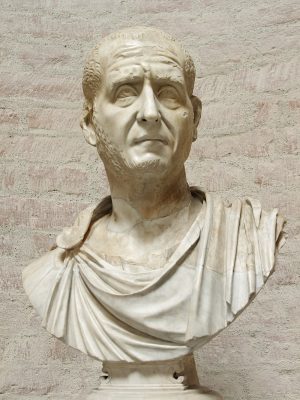Gaius Messius Quintus Decius was born around 201 to a wealthy family in Pannonia, in modern-day Serbia. He would marry Herennia Cupressenia Etruscilla, and they would have two sons, Herennius and Hestilianus. Decius would later on lead an excellent political career, becoming a member in the Roman Senate and a consul. He further distinguished himself as an able leader when he served as governor of Germania Inferior and, later, Hispania.
Rise to Power
In 248, Philip the Arab tried to resign as emperor because of the continued rebellion and foreign invasions on the Danube. He was not able to carry out his plans, however, as Decius, who was then serving as the prefect of Rome, persuaded him to stay in power. The following year, Philip sent Decius to the Danube to crush the rebelling legions and drive out the invading Goths. Decius successfully accomplished his errand. The legions, who were captivated by Decius’ able leadership, informed him that they were tired of Philip’s reign. Consequently, they proclaimed Decius as their emperor. Decius, having no such plans, quickly objected. Soon, Philip had heard of the proclamation, but Decius assured him he had no plans to take the throne. Philip, regardless, amassed his troops and prepared to crush what he perceived to be another rebellion. Decius sent more diplomatic messages to Philip but the emperor refused to listen. Decius now had no choice but to prepare for battle. The two forces eventually met in Macedonia, resulting in Philip’s death and his army’s defeat.
Reign
The Senate welcomed Decius as the new emperor. Decius then adopted the name Trajanus to express his intentions of imitating the great emperor’s leadership. The new emperor quickly began construction projects that included the repair of the Colosseum, which was then 170 years old and damaged by lightning strikes. Decius also started the building of a public bath complex, which later came to be known as the Baths of Decius. These baths opened to the public in 252, after Decius’ death, and were in use until the 16th century.
In 250, Decius tried to reinvigorate the people’s religious values by issuing an edict requiring everybody to offer sacrifices to the gods. Certificates were given to those who obeyed the edict, while those who refused risked execution. Though the edict was not targeted against any religious group, Christians viewed sacrifices as idolatry, and refused to comply. Pope Fabian was thrown into prison and died there, followed by the execution of many Christians.
In the same year, the Goths, led by their king, Cniva, invaded the Danube. The governor of Thrace, Titus Julius Priscus, would make matters worse by banding together with the Goths and proclaiming himself emperor. Not long after, he was slain by his allies. Following this, a Roman senator named Julius Valens Licinianus rebelled against Decius. The Senate supported him, but his rebellion was easily squashed by Publius Licinius Valerianus, who was in charge of the armies in the Rhine.
King Cniva and the Goths continued with their offensive into the city of Nicopolis, but Decius fended them off. However, the Goths swung back, overpowered Decius’ troops, and invaded Philippopolis before returning to their homeland.
Death
With revenge in mind, Decius assembled a new army and brought along his son, Herennius Etruscus, and a general named Trebonianus Gallus. Decius and the Goths clashed in June of 251 at Abritus, where Herennius was killed by an arrow early in the fighting. To keep the soldiers’ morale high, Decius told them, “Let no one mourn. The death of one soldier is not a great loss to the Republic.” Despite his valor, Decius would die in combat, along with the eventual defeat of his army. The humiliated Gallus was forced to sign a peace treaty with the Goths.
Gallus was declared emperor by the Danubian legions, while in Rome, it was Hostilian, the younger son of Decius, who was proclaimed emperor. Upon arrival in Rome, however, Gallus agreed to share the title with Decius’ other son, Hostilian.
Following their deaths, the Senate promptly granted Decius and his son Herennius, the status of gods.
